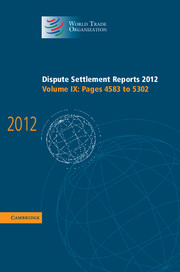European Union - Anti-Dumping Measures on Certain Footwear from China (WT/DS405) Report of the Panel
Published online by Cambridge University Press: 12 December 2017
Summary
INTRODUCTION
Complaint of China
On 4 February 2010, China requested consultations with the European Union pursuant to Article 4 of the Understanding on Rules and Procedures Governing the Settlement of Disputes (the “DSU”), Article XXIII:1 of the General Agreement on Tariffs and Trade 1994 (the “GATT 1994”), and Article 17 of the Agreement on Implementation of Article VI of the General Agreement on Tariffs and Trade 1994 (the “AD Agreement”). The consultations concerned: (1) Article 9(5) of Council Regulation (EC) No. 384/96 on Protection against Dumped Imports from Countries not Members of the European Community, as amended; (2) Council Regulation (EC) No. 1472/2006 of 5 October 2006, imposing definitive anti-dumping duties and collecting definitively the provisional anti-dumping duties imposed on imports of certain footwear with uppers of leather from, inter alia, China; and (3) Council Implementing Regulation (EU) No. 1294/2009 of 22 December 2009, imposing definitive anti-dumping duties on imports of certain footwear with uppers of leather originating in, inter alia, China, as extended to imports of certain footwear with uppers of leather consigned from the Macao SAR, whether declared as originating in the Macao SAR or not, following an expiry review pursuant to Article 11(2) of Council Regulation (EC) No 384/96.
China and the European Union held consultations on 31 March 2010. These consultations failed to resolve the dispute.
On 8 April 2010, China requested the establishment of a panel pursuant to Articles 4 and 6 of the DSU, Article XXIII:2 of the GATT 1994, and Articles 17.4 and 17.5 of the AD Agreement.
Establishment and Composition of the Panel
At its meeting on 18 May 2010, the Dispute Settlement Body (“DSB”) established this Panel pursuant to the request of China in document WT/DS405/2, in accordance with Article 6 of the DSU.
The Panel's terms of reference are the following:
“To examine, in the light of the relevant provisions of the covered agreements cited by the parties to the dispute, the matter referred to the DSB by China in document WT/DS405/2 and to make such findings as will assist the DSB in making the recommendations or in giving the rulings provided for in those agreements.”
- Type
- Chapter
- Information
- Dispute Settlement Reports 2012 , pp. 4585 - 5278Publisher: Cambridge University PressPrint publication year: 2014
- 2
- Cited by

